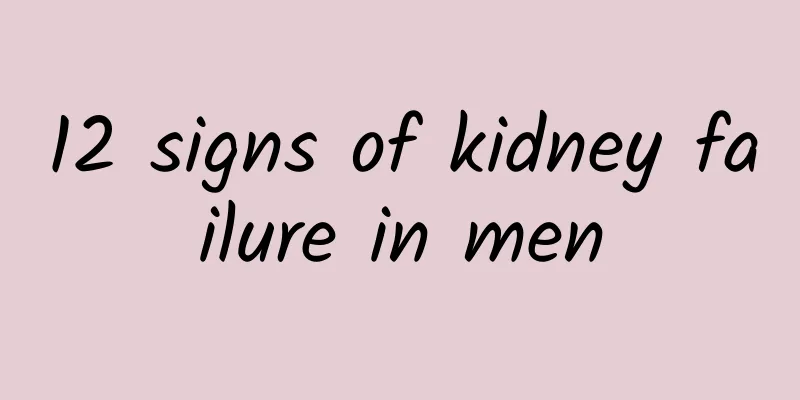What should men do if they have hypoglycemia?

|
Men usually have low blood sugar because of bad habits. Men usually have low blood sugar because they don't get enough rest, have unbalanced nutrition, are picky eaters, have poor appetite, etc. These people are prone to low blood sugar. So, how should men deal with low blood sugar? Management of mild or chronic hypoglycemia (1) Symptomatic treatment: When the patient is currently taking oral hypoglycemic drugs or insulin therapy, if there are symptoms or signs such as palpitations, sweating, weakness, hunger or dizziness, and they are aware of the manifestations of hypoglycemia, they should be given biscuits, candies or sugary drinks (containing 10-20g of sugar) immediately, and the blood sugar level should be monitored at the same time. Generally, the blood sugar level can be restored in about 10-20 minutes to maintain a certain blood sugar level. If the condition is not easy to relieve, 50% glucose solution can be injected intravenously or 10% glucose solution can be dripped intravenously. (2) Diet: A high-protein, high-fat, low-carbohydrate diet with small, frequent meals is recommended to reduce the stimulation on insulin secretion. 3. Etiological treatment: Hypoglycemia is a multi-factorial disease, among which hypoglycemic drugs only cause partial hypoglycemia. Diseases of the digestive system, endocrine metabolism and certain types of tumors can also cause severe hypoglycemia and should be treated accordingly. There are some other symptoms of hypoglycemia. (1) Sympathetic nervous system excitement manifestations: After hypoglycemia occurs, adrenaline secretion is stimulated to increase, which may lead to hypoglycemia syndrome. This is a compensatory reaction to hypoglycemia. The patient has pale complexion, palpitations, cold limbs, cold sweats, trembling hands, weak legs, general fatigue, dizziness, blurred vision, hunger, panic and anxiety, etc., which are relieved after eating. (2) Symptoms of mental disorder: Inhibition of the cerebral cortex, confusion, decreased orientation and recognition, drowsiness, sweating, tremors, memory loss, headache, apathy, depression, dreamlike state, dementia in severe cases, and some people may have strange behaviors. These neuropsychiatric symptoms are often mistaken for mental disorder. (3) Epileptic symptoms When hypoglycemia develops to the extent that the midbrain is affected, muscle tone increases, paroxysmal convulsions occur, and epileptic or epileptic-like seizures occur. Most of the seizures are grand mal or persistent. When the medulla oblongata is affected, the patient may enter a coma, decerebrate rigidity, bradycardia, no temperature rise, and disappearance of various reflexes. (4) Symptoms of involvement of the pyramidal tract and extrapyramidal system: When the subcortical central nervous system is inhibited, the patient may experience confusion, restlessness, hyperalgesia, paroxysmal chorea, dilated pupils, and even tonic convulsions. If the extrapyramidal system and pyramidal tract are positive, the patient may experience hemiplegia, mild paralysis, aphasia, and monoplegia. These symptoms are mostly temporary and can improve rapidly after administration of glucose. Damage to the extrapyramidal system may involve brain tissue structures such as the globus albicans, caudate nucleus, putamen, and cerebellar denticulate nucleus, and may manifest as tremors, euphoria, hyperkinesia, torso spasms, etc. (5) Symptoms of cerebellar involvement: Hypoglycemia can damage the cerebellum, with symptoms such as ataxia, incoordination of movements, inaccurate distance perception, low muscle tone, and abnormal gait. Especially in the late stage of hypoglycemia, ataxia and dementia are common. (6) Manifestations of cranial nerve damage: Hypoglycemia may cause cranial nerve damage, manifested by abnormal vision and visual field, diplopia, vertigo, facial nerve paralysis, dysphagia and hoarseness, etc. Usually you should pay attention to a reasonable and balanced diet, and be careful to avoid overwork. At ordinary times, you should pay attention to reasonable health care to avoid affecting the sympathetic nervous system, which will also cause patients to experience palpitations, insomnia, general fatigue, and seriously affect the body. At ordinary times, everyone needs to pay attention to reasonable health care to avoid causing consciousness disorders. |
<<: How to make the popular honey butter almonds
>>: Don’t forget that hemorrhoids and perianal abscesses are not the same disease
Recommend
What causes testicular pain in men?
The male testicles play a big role in reproductio...
What is the normal size of the seminal vesicle?
The seminal vesicle is a part of the male reprodu...
What is the reason why men grind their teeth at night?
Many people don’t know what kind of sleeping posi...
What exactly is the cause of red and swollen glans?
If a male friend finds that his glans is red and ...
What are the male enhancement massage techniques?
If a man has kidney deficiency and impotence, it ...
What to do if the male genital foreskin is too long
Some men have problems with their genitals, so ti...
What are the contents of male infertility tests?
Male infertility is the most worrying disease for...
Can impotence be treated surgically?
Impotence is a very harmful male disease. Its har...
Reasons for yellowish semen
Nowadays, many people pay attention to their dail...
When can a woman not touch a man?
There is a common phenomenon in life called "...
Is a hard nodule on the penis a sign of penile cancer?
The penis is an important male reproductive organ...
What is the normal size of the penis?
What is the normal size of the penis? I think thi...
Does prostate calcification affect sexual life?
Prostate is one of the main signs of men. We all ...
What's the matter with the sudden swelling on the penis skin?
The penis is a very important reproductive organ ...
Why does my head hurt after ejaculation?
Sexual life between husband and wife is a very im...









